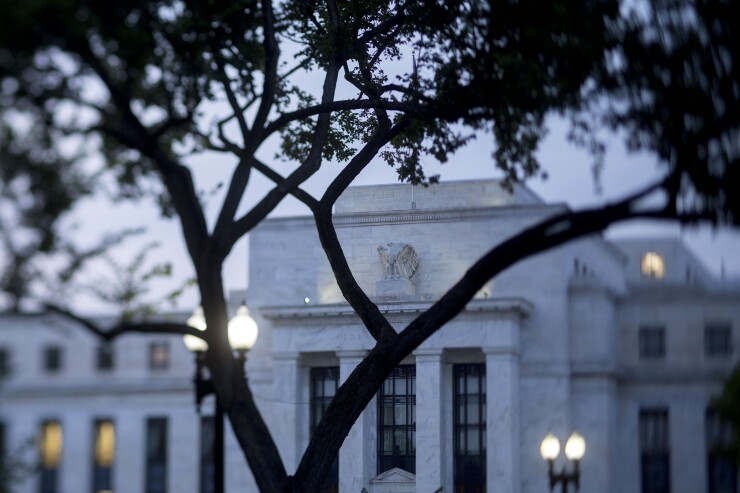Want unlimited access to top ideas and insights?
Municipal market participants are confused, to say the least, about the Federal Reserve and its ability to buy long-term municipal securities. And there’s a good reason for the puzzlement.
The Coronavirus Aid, Relief, and Economic Security (CARES) Act authorizes the Fed to purchase munis through a $454 billion Economic Stabilization Fund, and $150 billion is earmarked for direct federal aid to states and municipalities.
But, the language in the CARES Act is subject to interpretation, and can be misleading.

“There does seem to be some confusion and a lot of speculation in the market surrounding potential Fed purchases of munis,” according to Brian Musielak, senior portfolio manager for Commerce Trust Co. “When first announced, we got word that the Fed would be buying within 10 days of the signed bill. As it turns out, the actual language does not apply to muni purchases.”
And the timeline appeared “impossible,” he said, “given no established channels for making such purchases existed.”
The Act allows the Fed to buy munis with longer than six-month maturities through the $454 billion economic stabilization fund, he noted, but “with few additional details released, there is much speculation on the exact timing and overall breadth of the Fed purchases.”
“While they can purchase obligations in the secondary market, in our view it is more for them to focus their efforts in the primary market,” he said. “The new-issue muni market remains in limbo, despite the market stabilizing.”
And no guidance was offered regarding “minimum rating, maximum maturity, and sectors the Fed will target,” Musielak added. “Given the Fed’s mandate to ensure a functioning market, some answers may be provided by the market itself. Any dislocations will be closely tracked.”
Steven Skancke, chief economic advisor at Keel Point, isn’t convinced the law allows the Fed to buy longer-term munis.
The Fed, he said, believes “its mandate is limited to assuring liquidity on all debt markets.” And if the Fed thought the municipal bond market needed to be propped up, “it probably could find a way,” but for now the market seems to be functioning well.
Congress would need to be more “explicit” in authorizing the Fed to step into buying or supporting longer-dated munis beyond six-month maturities.
The CARES Act “appears to allow the Fed to purchase municipal bonds either directly from the issuers or in secondary markets, and also, it seems, authorizes the Fed to make loans directly to municipalities,” said Peter Ireland, an economics professor at Boston College and a member of the Shadow Open Market Committee.
And while the authorization is in place, “the tricky issue” remains “how the Fed would actually design the programs,” Ireland said. “The challenge would be to facilitate the flow of credit to municipalities without becoming an independent source of volatility in bond prices, avoiding circumstances in which traders start to speculate on which particular issues would be purchased or not. A related question is how the program would allocate credit across states: uniformly or according to some judgment about need?”
Gary Pzegeo, head of fixed income at CIBC Private Wealth Management, said the CARES ACT lets the Fed include munis in emergency funding facilities backed by the Treasury Exchange Stabilization Fund. “We expect the Fed to establish [a special purpose vehicle] with the Treasury first loss position, and would not be surprised if they used a strategy similar to the approach taken in the investment grade corporate market.”
This would mean “bringing in a third party to manage the allocation of capital under broad parameters set by the Fed and under the oversight of Congressional commission established by the Act,” he said.
And while the $454 billion is authorized, “the Fed has not finalized this program as yet,” said Berenberg Capital Markets U.S. Economist Roiana Reid. “The Fed’s part of Cares Act is still to be decided.”
The Act authorizes and funds "Fed activity, allowing for significant flexibility in whether and how the Fed proceeds," said Bill Merz, director of Fixed income at U.S. Bank Wealth Management. "The CARES Act does not dictate how much to allocate to municipals versus businesses or corporate bonds, nor does it guarantee the outright purchase of municipal bonds."
Before this law, he said, "the Fed had announced liquidity support for highly rated municipal debt with less than a year to maturity. Rather than purchasing debt outright, those measures provide short term financing to banks that post eligible municipal debt as collateral."





